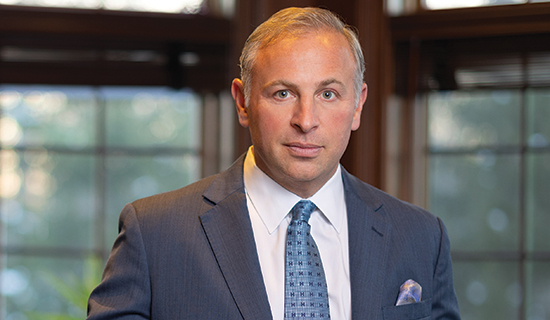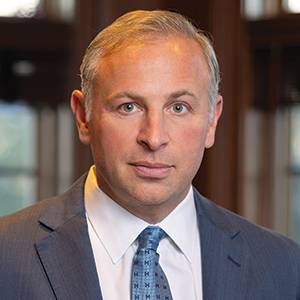Following several years of rapid expansion, Benesch is quickly outgrowing its Cleveland headquarters at 200 Public Square. Now, as the law firm prepares to move into new offices at Key Tower, managing partner Gregg A. Eisenberg is fired up about the opportunities that lie ahead.
“It’s an exciting time for our Benesch family,” says Eisenberg, Benesch’s managing partner since 2015. “We’re one of the fastest-growing firms in the country, with more than 300 lawyers in offices across the U.S. We’re very proud of our substantial growth across all of our core practice areas over the last few years.”
From real estate to health care, litigation, employment, commercial finance and more, every practice area at the firm is experiencing growth. And although the uncertainties of the pandemic have drastically shifted the work environment, Benesch continues to expand its footprint from coast to coast by focusing on client service.
“We continue to attract the best talent and expertise, which in turn has helped us attract and retain our outstanding client base,” Eisenberg says.
Here is Eisenberg’s approach to growing the firm, even through a global pandemic.
Road to growth
In the last seven years, Benesch has grown from 110 lawyers to 315, bringing the total employee count to 527 as of March 2022. Last year alone, the firm added 57 lateral hires, experienced lawyers who left other established law firms to join Benesch.
During that same period, Benesch also added offices in Chicago and San Francisco. With additional offices in Columbus, Ohio, and Wilmington, Delaware, the firm’s footprint essentially reaches from coast to coast to provide legal services for clients across the country.
Since launching its Chicago office with just two partners in August 2015, the firm now employs nearly 100 attorneys in that location and was recently named the fastest-growing law firm in Chicago, with 211 percent growth over the last five years, according to Chicago Lawyer.
This growth has been purely organic, Eisenberg says, the result of targeted recruiting efforts to bolster the firm’s bench strength. As a result, the firm reported 2021 revenue of $212 million, a 23.2 percent increase over 2020. Meanwhile, revenue per lawyer increased 11 percent, a testament to the collective strength of the Benesch team working together toward a common goal across offices and practice areas.
“One of the keys to our recent growth is that we have one team, and everyone is rowing in the same direction,” Eisenberg says. “They’re all very focused on client service, and that has been the main contributor to our growth.”
Cultural fit
While a cohesive team is the key ingredient to continued growth at Benesch, Eisenberg credits the firm’s culture as the glue that binds them all together.
“In order to attract and retain the best possible talent, you have to have a great culture,” says Eisenberg, who’s heavily involved in recruiting lawyers at the firm. “We have a collegial culture here, and that’s really what sets us apart. When we meet with laterals and they dig into our firm, they see an outstanding environment that they want to participate in and be a part of.”
That’s why, when vetting potential new hires, Eisenberg isn’t just looking for impressive legal skills or experience. More important, he wants to find a cultural fit.
“We always try to make sure that they fit our culture — that they’re not only great lawyers, but they will fit in with us, collaborate with us and work well with our Benesch family and also our clients,” he says. “We are looking for team players who are very focused on client service.”
Over the years, Benesch has developed a robust integration program to onboard new hires by familiarizing them with the firm’s culture throughout their first year on staff. Its tech-enabled onboarding platform is designed to share critical information with new employees, while introducing them to other members of the team.
“We take integration of new laterals very seriously,” Eisenberg says. “This program has been a tremendous value for us, not only for our firm, but for new hires to get acclimated into our firm and learn more about who we are and what we stand for. That has allowed them to immerse themselves into our firm and instantly provide outstanding client service in their transition period.”
By making lateral hires feel at home and part of the Benesch family, the program plays a big role in the firm’s remarkable retention rate. Eisenberg says the firm’s lateral retention rate consistently averages over 80 percent, which significantly outpaces the industry average of about 50 percent.
“Not only does that provide a benefit for retention,” Eisenberg says,” it also provides a benefit for our clients by having continuity in the legal services that we provide.”
In addition to onboarding, Benesch attorneys also benefit from ongoing training through Benesch University. The longstanding program is geared toward young lawyers at the firm, with the goal of developing their technical, professional, leadership and business development skills. Eisenberg describes the format as a multipronged experience that spans one-on-one mentorships, traditional classroom activities and computer-based training modules.
“Benesch University has helped us attract talent to the firm,” he says, “because people want to utilize this program to enhance their careers.”
Pandemic pivot
For most of the firm’s history, Benesch’s vibrant culture has depended on personal interactions. Eisenberg encouraged employees to visit different offices as the firm’s footprint expanded across the country, as a way of keeping the Benesch family connected. But when the COVID-19 pandemic hit in March 2020 and mandates precluded staff from entering the office, this approach suddenly shifted.
“We pivoted very quickly to remote work,” Eisenberg says.
The firm relied on video conferencing software to stay in touch with associates and clients as legal questions flooded the team.
“At the onset of COVID, we were incredibly busy helping our clients manage through the pandemic and figure out how and when they could operate their businesses,” he says. “Our clients were able to pivot to work remotely and grow their businesses, which resulted in us being historically busy. We saw an uptick in every single core practice at the firm.”
Even after the initial lockdowns lifted, Benesch eased back into office life with a hybrid approach to working both remotely and on site. Two days a week are designated as core office days, when employees are expected to be in the office. Eisenberg tries to make those days as productive for the team as possible, scheduling internal meetings as well as team-building activities like company breakfasts, lunches and after-work happy hours.
The other three days, employees are free to work wherever they prefer, either in the office or at home. A significant number still report to the office on those days, Eisenberg says, because of the firm’s strong culture. This flexibility, he says, is here to stay.
“Going forward, flexibility will be a significant component of how we work,” he says. “Videoconferencing is an effective tool, and I think it’s here to stay. But there’s a tremendous value for our team to be together to provide the best possible client service, so I think there will be a little bit of both.”
Making a move
As a result of rapid growth over the years, the Benesch team had scattered across its current office space, where the firm has been based since 1994. The noncontiguous sprawl made it difficult for staff to truly come together on core office days, and when Eisenberg started looking for a bigger space, he didn’t have to look far to find a place in Key Tower, less than a block away.
“Key Tower checked all the boxes of what we were looking for,” he says. “What was important to us, first thing, was to remain in the city of Cleveland, because this has been our home for almost 85 years. We wanted to retain a significant presence in the Cleveland market, and Key Tower is really an iconic landmark here.”
Key Tower also offered plenty of contiguous office space across eight floors of the city’s tallest building. In addition, the attached hotels, restaurants and other amenities provide plenty of bonding opportunities for Benesch associates and clients. With nearly 165,000 square feet over eight floors, the new office location not only offers more space but also more efficient space for the Benesch team to collaborate.
“We’re currently in the planning process to design an incredible office space for our Benesch family, and we’re really excited about the layout we’re developing,” Eisenberg says. “COVID has really changed how we work, and this gives us an opportunity to lay out a different type of office design as we continue to grow our firm in the future.”
A team of Benesch lawyers and staff is helping design the layout of the new space before the move, scheduled for the summer of 2023. Eisenberg says their involvement is critical to building a space suited to the team’s evolving needs. For example, larger common areas and coffee bars will be key elements, providing collaborative spaces where associates can work in groups or meet with colleagues and clients.
The goal is to create a space where employees want to be. In this new era of remote work, when employees have a choice of where to work, Eisenberg says a welcoming office atmosphere is more important than ever.
“You have to give people a reason to make the commute and come in, an office space that allows them to interact with one another in a more flexible arrangement,” he says. “We need to design a space that’s attractive to our team, so they want to be in collaborative spaces together.”
Looking ahead
Business growth isn’t always easy — especially when you nearly triple your staff size within a few years while opening new offices across the country and planning a headquarters move. Yet despite the expansive geographic distances and the uncertainties of growing during a global pandemic, Eisenberg manages growth at Benesch with a team approach.
“The biggest mistake that you can make is losing connectivity with your team as you get bigger,” he says. “That can happen when you have more and more people join your family. So, we’re very focused on making sure that we maintain connectivity and spend time with each other. We still want to say we are a family, we care about one another and we know each other very well — and that takes a lot of time and effort.”
Now that business travel has resumed, Eisenberg encourages employees to visit other Benesch offices around the country, while staying connected via video conferencing. Hoping that the firm’s new Cleveland office will help draw more associates and clients to the firm, he’s looking forward to continued growth.
“We’re very focused on what brought us here: superior client service and a great culture. But we’re also very excited about our future prospects for growth in all of our core practice areas and existing office locations,” he says. “The best advice I could give is to focus on your team and your clients, and provide both those groups with incredible support. When your team is successful and your clients are successful, you’re going to build a successful organization.” ●
TAKEAWAYS
- Focus on your team and clients and provide them with incredible support.
- Flexibility has become an increasingly important component in how companies work.
- A great culture is critical to attracting and retaining the best talent.


